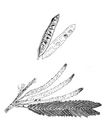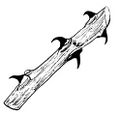Acacia polyacantha (Bekele-Tesemma, 2007)
| Acacia polyacantha (Bekele-Tesemma, 2007) |
Acacia polyacantha subsp. campylacantha (Fabaceae, indigenous)
Common names
- English: Falcon’s-claw acacia
- Amargna: Gmarda
- Tigrigna: Gumero
Ecology
A widespread acacia found from India to tropical Africa. In Ethiopia, commonly found in wooded grassland, deciduous woodland and bushland and riverine forests in Dry and Moist Kolla agroclimatic zones of Shoa, Gonder, Gojam, western Tigray, Ilubabor, Kefa, Gamo Gofa and Sidamo regions, 500–1,600 m. May indicate fertile soil and groundwater but can also grow in stony soil.
Uses
Firewood, charcoal, timber, posts, farm tools, medicine (leaves, roots), fodder (leaves, pods), ornamental, nitrogen fixation, soil improvement, live fence.
Description
A tree to 25 m with feathery foliage but an open canopy often with a flattened but spreading crown.
- BARK: Yellowbrown, flaking, later grey-brown, fissured.
- THORNS: Brown, black tips, usually less than 1 cm and hooked.
- LEAVES: Compound, 13–40 pairs of pinnae, leaflets very small and narrow, leaf stalk hairy with glands, to 20 cm.
- FLOWERS: Large, cream‑white spikes, to 12 cm, 2 or 3 together, fragrant.
- FRUIT: Brown smooth pod, tip pointed, flat to 18 cm, splitting to set free seed.
Propagation
Seedlings, wildings, direct sowing at site.
Seed
Seeds prolifically. 14,000–16,000 seed per kg.
- Treatment: No need.
- Storage: Seed can be stored if kept cool, dry and insect‑free.
Management
Fast growing on good sites; pollarding, coppicing.
Remarks
The wood is termite resistant. The tree is host to many insects and pests.



